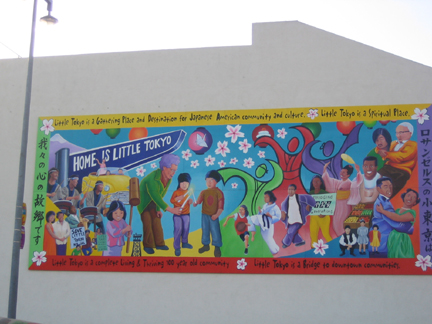A current mural in Little Tokyo Downtown Los Angeles. Photo by P.C. Staff
LOS ANGELES — Little Tokyo Service Center and the Little Tokyo Community Council released a groundbreaking community vision on March 10 for a sustainable Cultural EcoDistrict. As Little Tokyo celebrates its 130th anniversary this year, the community is demonstrating a plan to keep Little Tokyo thriving for the next 100 years.
Over the past 18 months, Little Tokyo has been developing a vision for neighborhood sustainability that respects and enhances the neighborhood’s history and culture.
The vision is based on community values for resource conservation, “mottainai,” and consideration of children and future generations, “kodomono tameni.” It is also focused in the short term on transit-oriented development around the new Little Tokyo/Arts District Regional Connector station. In the long term, the vision identifies the opportunity to create a Cultural EcoDistrict to support the entire neighborhood.
In addition to affordable housing, cultural facilities, creative office space and pedestrian-oriented retail, the vision proposes an ambitious set of district-scaled green infrastructure — district heating and cooling, stormwater collection planters, “living machine” graywater filtration landscaping and a minisolar electric grid. The community vision was supported by the National Resources Defense Council, Local Initiatives Support Corporation and Enterprise Community Partners.
“We look forward to working with public- and private-sector partners in order to realize this vision,” said Craig Ishii, chair of the Little Tokyo Community Council. “Our concept vision can be a model for the City of Los Angeles and the entire country for community-based sustainability.”
The Little Tokyo initiative is one of 13 programs selected nationwide to participate in Partners in Progress, which is funded by the Citi Foundation and the Low Income Investment Fund.
Through PIP, LTSC and the other grantees will be able to initiate or deepen development or expansion of local stakeholder networks to improve places — the physical environment of a community including housing, transit and safety— and create opportunities for people — such as jobs, child development, education and health.
The visioning document is available online at http://littletokyola.org/.
Originally published on March 21, 2014




